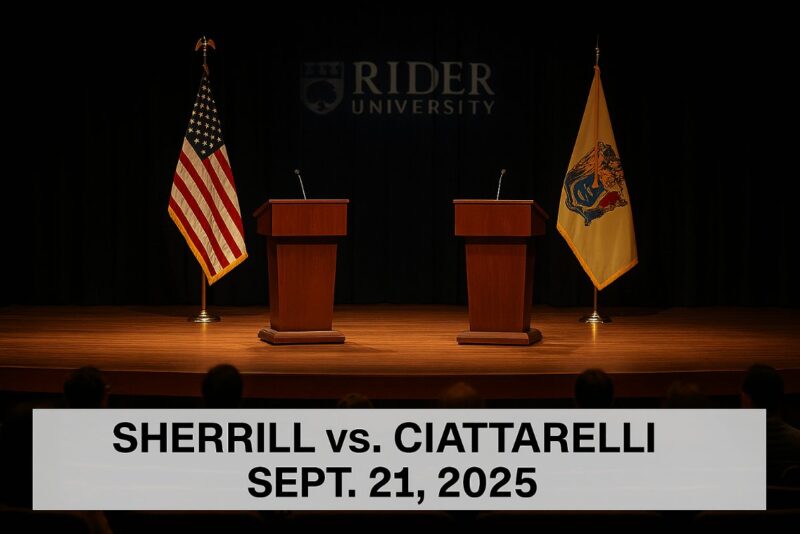A Pivotal Clash as Votes Begin to Roll In
In the crisp autumn air of Lawrenceville, where Rider University’s campus hums with anticipation, New Jersey’s political future hangs in the balance. On Sunday, September 21, 2025, Democrat U.S. Rep. Mikie Sherrill and Republican former Assemblyman Jack Ciattarelli will step onto the debate stage for their first face-off in a bruising race to succeed term-limited Gov. Phil Murphy. With mail-in ballots hitting mailboxes that very day and Election Day looming just six weeks away on November 4, this debate isn’t just discourse—it’s a heartfelt crossroads for families grappling with affordability crises, education woes, and a statehouse in flux. For voters like single mom Elena Ramirez in Newark, who juggles rising costs and school choices, it’s a raw plea: Who will fight for our tomorrow? As tensions simmer in this increasingly heated contest, tuning in means witnessing history—and perhaps, a turning point for the Garden State.
The Human Toll: Voters’ Hopes and Hardships on the Line
For Maria Gonzalez, a retired teacher in Trenton whose pension barely covers escalating property taxes, the gubernatorial race stirs a quiet storm of hope and fear. Sherrill, a Navy veteran and ex-federal prosecutor who flipped a red district blue in 2018, embodies the grit of a mom of three balancing national security creds with local empathy. Ciattarelli, a business owner who nearly toppled Murphy in 2021, channels the frustration of suburban dads tired of “tax-and-spend” policies. Their debate collides with real lives: Gonzalez worries if Sherrill’s push for affordable housing will ease her fixed-income squeeze, or if Ciattarelli’s tax-cut vows will finally deliver relief without gutting schools.
Across the state, from Jersey City’s bustling ports to rural Sussex farms, the stakes feel personal. Polls show a dead heat—Sherrill at 46%, Ciattarelli 44% among likely voters—fueled by debates over abortion rights post-Roe, opioid crises claiming young lives, and transit woes stranding commuters. For immigrant families in Paterson, it’s about access to services; for small-business owners in Asbury Park, survival amid inflation. This first debate, amid early voting’s start, amplifies their voices—or silences them if unaddressed—turning policy into poignant pleas for a fairer New Jersey.
Facts and Figures: Debate Details and Race Snapshot
The inaugural debate unfolds at Rider University in Lawrenceville, a neutral ground symbolizing the state’s diverse heartland. Exact start time awaits confirmation, but expect a 90-minute format typical of gubernatorial clashes, broadcast statewide to reach 9.2 million residents. While full viewing options are pending official release, anticipate streams via NJ.com, WHYY, and public TV affiliates like NJ PBS, with potential simulcasts on News 12 New Jersey and local radio (101.5 WHTG for Monmouth coverage).
Key race metrics underscore the tightness:
| Aspect | Details |
|---|---|
| Candidates | Mikie Sherrill (D, U.S. Rep., Navy vet); Jack Ciattarelli (R, ex-Assemblyman, 2021 nominee) |
| Date/Time | Sunday, Sept. 21, 2025 (time TBD, likely 7 p.m. ET) |
| Location | Rider University, Lawrenceville, N.J. |
| Polls | Sherrill 46%, Ciattarelli 44% (Monmouth Univ., Sept. 2025); 10% undecided |
| Key Issues | Property taxes (avg. $9,300/home), education funding, abortion access, economy |
| Voter Turnout Projection | 60% (down from 2021’s 62% amid mail-in surge) |
| Early Voting | Mail-in ballots mailed Sept. 21; in-person Oct. 7-Nov. 2 |
No moderator named yet, but expect questions on fiscal woes—N.J.’s $68 billion budget grapples with pension shortfalls—and Ciattarelli’s 2021 near-miss (51-48% loss to Murphy). Sherrill’s edge: fundraising lead ($12M vs. $8M); Ciattarelli’s: GOP base mobilization post-Trump.
Broader Political Context: A Bellwether for Blue-State Battles
This showdown caps a decade of Democratic dominance—Murphy’s 2017-2021 sweep flipped N.J. bluer—yet cracks show: Ciattarelli’s 2021 surge tapped suburban backlash to mandates and taxes, echoing national red waves. Sherrill’s moderate pitch—backing cannabis legalization, gun reforms—aims to hold urban cores while peeling independents (35% of electorate). The race mirrors 2025’s national undercurrents: Post-Trump GOP pushes tax relief amid inflation (N.J. CPI up 3.2%), while Dems defend social nets against abortion bans.
Historically, N.J. governors wield veto-proof power, shaping everything from transit (NJ Transit deficits hit $1B) to climate resilience post-Sandy. With Murphy’s progressive legacy—paid leave, minimum wage hikes—on the ballot, expect barbs: Ciattarelli slamming “tax hell,” Sherrill touting “proven leadership.” As mail-ins launch, turnout could swing on youth (18-29: 45% Dem lean) vs. seniors (65+: 52% GOP). Globally, it echoes Canada’s affordability fights, but here, it’s a microcosm of America’s divide: Progress or prudence?
What Lies Ahead: From Debate Stage to Ballot Box
Post-debate, expect fact-checks from NJ Spotlight News and voter guides via Vote.org. Sherrill eyes October town halls in Camden; Ciattarelli, South Jersey rallies. With absentee requests up 15% from 2021, early momentum matters—N.J.’s 2020 mail-in boom (85% of ballots) proved pivotal.
Resilience shines in civic action: Nonprofits like Rock the Vote host watch parties, urging registration (deadline Oct. 15). For governance, a win either way signals blue-state viability—Sherrill sustains Dem trifecta; Ciattarelli flips to GOP vetoes. Lessons from Murphy’s tenure: Bipartisan wins on infrastructure. As November nears, adaptation means informed votes—debate clips dissected on TikTok, forums bridging divides—to honor N.J.’s purple promise.
Conclusion: Tuning In to New Jersey’s Gubernatorial Debate Crossroads
The Sherrill-Ciattarelli debate marks a sacred Sunday in New Jersey’s heated governor’s race—a beacon for voters like Maria, pleading for policies that heal, not harm. As screens light up and ballots drop, this face-off demands we watch not just for zingers, but for heart: Who envisions a state where every family thrives? Stream it, discuss it, vote it—because in this pivotal clash, your voice isn’t optional; it’s the game-changer.






